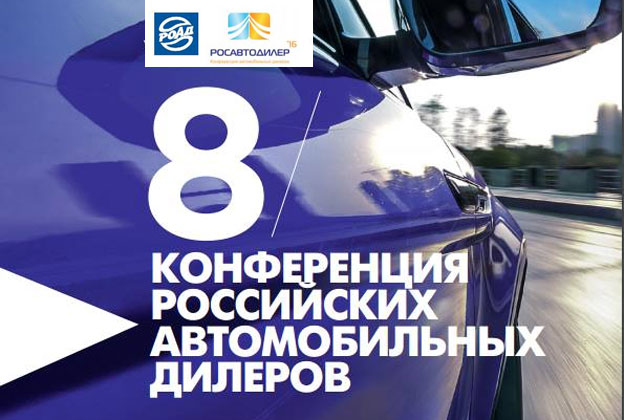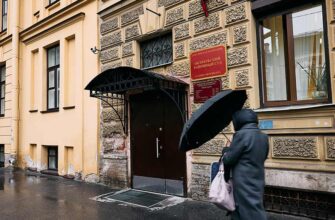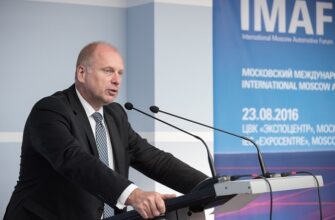Representatives of the government and the business community, which determine the development of the national automotive market of Russia, took part in the annual trade forum Rosavtodealer held on October 20-21, 2016.
The range of issues raised on the forum is not limited by retail sales of new cars. It is connected to Russian society of motorists, the automotive industry in general and associated industries.
The Forum organizer is Association of “Russian automobile dealers” (ROAD), founded in 1994. It defends the interests of more than 1’000 car dealer centers selling over 40% of foreign cars sold in Russia. The purpose of the organization is representing the interests of its members in communication with the authorities, car manufacturers, other Russian and foreign companies and organizations, as well as exchange of experience and information inside the dealership.
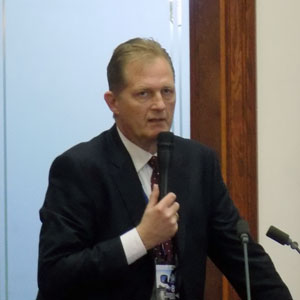
According to the forecast of J. Schreiber (the Association of European Businesses, or AEB), about 1.4 million cars and light commercial vehicles will be sold in 2016. Resulting 9 months, according to the AEB, the market fell by -14.4% compared to last year and still continues to fall. According to ROAD, 800-900 dealerships will be closed this year. In 2017 will be the same or “a little worse” (J. Schreiber).
Sales of new vehicles are directly dependent on consumption. Because at the moment the possibility of consumption in the country is declining, the industry players rely on state support, which will allow them to survive as a business and to keep jobs.
In 2016, the support of the Ministry of industry and trade to auto industry counted 60 billion rubles. The main support programme was the renewal of the vehicle fleet (22.5 billion spent, according to the program more than 300 thousand cars are sold, including the 75% recycling, 25% trade-in). Assistance to the automotive market also provided by preferential loans (10 billion, more than 200 thousand cars) and leasing (2.8 million, more than 30 thousand cars).
In 2017 the government plans to support the market too. The format and amount of assistance will be determined by the end of 2016, in November. The state plans a broad discussion of the initiatives. The content of support will definitely change: “the economic effect from everlasting shares cannot be counted,” – said A. Morozov (Ministry of industry). It will also be more targeted. The Deputy Minister said that “we need to attract new customer segments”, because today 80% of first car purchases are used units. Substitution of the segment should go to the budget domestic cars, the government sees here the potential growth of domestic production.
Where to go the Russian car dealer in the conditions of falling market? We offer to a brief overview of the discussions of the forum.
Automakers and car dealers
Auto industry self-regulation tool named “Code of conduct for manufacturers”, or “good practice” From came to us from world practice in 2013. At the moment it is recognized (approved) by the majority of the members of the AEB and authorized by FAS of Russia and Ministry of industry and trade of the Russian Federation. The meaning of this tool is that even the auto makers are not clamping in law, they behave themselves with the dealers in good manner, “reasonable” for no conflict could rise. This is something like a code of honor, rules of conduct.
The dependence of the dealer from the car manufacturer lies in the concept of dealing. The dealer is a trader, intermediary, and this means that the dealer sells the manufacturer’s product in a particular territory according to agreed rules and predetermined conditions (dealership contract agreement). The choice of the dealer, the terms of the contract, work with him and his termination, and compensation are determined primarily by the product manufacturer.
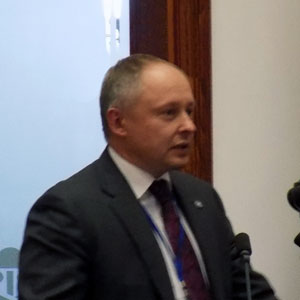
Despite the fact that automakers are the global companies, “Codes” differ in each country. V. Zhigalov (ROAD) emphasizes that in the Russian reality of the self-regulation of the industry is broadly correct, but the Code needs to change. “In America, no automaker can close the dealership, but here it happens,” says V. Mozhenkov (ROAD). In Europe the same automakers’ terms of dealer contracts are much milder than in Russia.
ROAD is negotiating with the aim of obtaining the same conditions, “equal”, but at this stage the negotiations a dead end have been reached. “Three years have passed, and our proposals are not taken into account. Therefore, the Council decided to put on the regulation of the market. If the AEB changed its position in this regard, we are ready to change their position,” says V. Mozhenkov.
The Association of European Business shows no particular desire to meet the dealers, because today in Russia it is too hard. “You need to avoid the feeling of discrimination”, says J. Schreiber to the dealer community. “The code is the code of AEB members, but not of the whole market,” he says. Summary is: “We must come together, not to scold each other”.
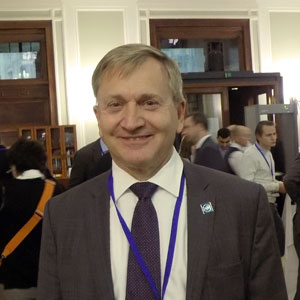
“I was involved in the code, probably from the beginning – says to “E Vesti” Steve Chernysh, – We started this conversation, as soon as the topic arose in Russia. From the very beginning it was constructive, but the problem is that, first, the clock is ticking and, secondly, the code takes into account the different interests of many manufacturers, not all of which even endorsed this code. And in order to approve it is a wish to change the previously introduced conditions. The result is a sort of semi-code, which received a sufficient number of votes to pass, but the execution is optional. It requires much more consideration by legal means, for example, with intermediation of FAS, etc., through a third organization. And I hope that manufacturers and dealers will be able to develop an improved version of the code that will satisfy all parties”.
Already on November 03, 2016 at the Federal Antimonopoly Service (FAS) a meeting of the expert covert was held, which will consider amendments to the Code.
The most important regulatory role in the auto business, of course, plays a government which is able to influence the situation, including the reconciliation of Russian companies with their European colleagues. “We believe that the balance of producers and dealers must be respected. For us both sides are equal investors,” said A. Kashevarov (FAS Russia).
“Now it is the time to evaluate the results of the introduction of the Code – he said, – We hope that we will be able to fix it.” But, in General, the main focus of the government is on the consumer: “All relationships on the market should develop the benefit of consumers”, concluded the representative of the FAS.
The investment climate in auto retail
Taking into account the weight of objective and subjective issues that arise in working in the Russian market, the investment climate here leaves much to be desired.
In politics the problem is, on the one hand, the structural disorder of the auto retail. It is considered by the government as part of the retail sales and its activities are distributed to many ministries and departments. For example, dealers should be included in the program of preferential credit (for investment loans), but they can’t take advantage of it, because the market does not fall under the requirements. This question needs approach to the automotive industry not only as the production and sale of cars, but as the whole chain from development to recycling. This is one of the key proposals of automobile dealers to the government.
On the other hand, due to the fact that the majority of dealers are small and medium-sized businesses, which in essence in Russia is extremely unstable, there are many risks that lead to the closure of dealer outlets in the crisis years.
Today the Russian auto retail is not interesting for foreign investors according to economic criteria and the potential risks. As explained for “E Vesti” Steve Chernysh: “Globalization of the Russian market is in process. I met a representative of Mitsui, this Japanese company has several dealerships in Russia. Another well-known British dealer Inchcape, who was one of the first to enter our market. They are the exception, because our market is not stable enough today for large dealer groups’ investments here. Most of them easily invest in the United States, Europe, Asia and so on. There is also a large group of investors, which invests in Brazil. And I think that while our market not stabilized, and while he would not come to any certain measure of stability over 2.5-3.0 million cars annually, few can be willing to take risks, as the Japanese or Inchcape”.
Despite the fact that with falling of ruble exchange rate opportunities for exports of Russian products and services were created, dealers are limited to the national borders and do not think of extending the network beyond Russia. “None of the Russians from small and medium businesses, who can go abroad and open a business there, never thought about it, not thinking, and I think, won’t think,” says V. Mozhenkov. But, overall, this is a question for investors rather than for dealers.
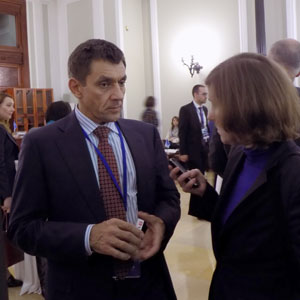
To overcome problems, time for negotiations with the government and will are, and the dealers here have demonstrated a constructive approach. Judging by the comments of D. Gulin to “E Vesti”, the dealers are full of willingness and determination to achieve stability in the industry: “This is not the first event, which take place in such a dialogue. And here, maybe, we are not actively using the opportunities provided, but it is an evolutionary process and we are gradually “adapting” to each other.
Our industry is fairly new. In the Soviet Union there was no concept of car dealers, but most of our services lead to the era and it’s hard for us to rebuild. If the American Association NADA, for example, is created in 1917, then, correspondingly, next year it will be 100 years old. And we are much younger and have less experience, we learn yet.
In General You are right that we have a constructive dialogue, each time at such events we receive such impulses. I hope that we will use them”.
Russian society and the automobile business
Area of automobile business in Russia is not limited only to cars. The market influence a number of adjacent markets: credit, insurance, chemicals and etc., as well as social services in terms of education and employment.
“Suppliers of light commercial vehicles, trucks, motorcycles became members of ROAD. They found us as a unifying platform for expanding further in order to defend their interests,” – said V. Mozhenkov in an interview to “E Vesti”.
Interests mean those arising new circumstances, which requiring participation. So, in auto insurance, according to the Russian Union of Insurers, the category of unfair legal intermediaries formed. They buy up rights settlement for the victim and sue with the insurance companies and dealers. Market participants will together fight this phenomenon, preparing the base under the regulation of insurance business together with the Central Bank. The future of this market is Euro Protocol, which requires the definition of rules.
Interests need to be defended because sometimes it is necessary to overcome legislative barriers. As V. Zhigalov told in an interview with “E Vesti”: “I was involved in consumer law and specialized loans. We sent in December sent the specific text regarding “Consumer extremism” to the government. Unfortunately, he lost in agencies. The Ministry forwarded it to the Ministry of economy, which said that it sees no possibility to discuss it in the working group. In the end we are shown on the Consumer Service, which is responsible for protecting the rights of consumers. At the moment the service didn’t answer the questions. So here it is a node”.
So, ROAD has a wide field of activities. “We will cooperate with all the regulators of the market, which are somehow involved in our business with all government agencies, with social structures is our core activity, – said V. Mozhenkov, and today the first session of the conference shows it. We invite everyone to listen, to ask questions, to express his position. It is very important: to hear, to listen and to react”.
According to V. Zhigalov, one the dealership employs about 100 people in general. According to Autobusinessreview, in Russia there are over 4’000 points of sale (franchise). So, there is national significance of car dealerships.
As commented on to “E Vesti” D. Gulin: “Economic, social and demographic significance of the industry is large, because we are really a big industry. Other countries appreciate the automotive retail as the most influential from the point of view of its contribution to retail sales of the entire economy. But, from the point of view of social importance, we are not yet adequately appreciate the role of dealers in our life. At least the fact that dealers perceive first as resellers of cars. Actually, I was just doing a little research, 70% of the staff in the dealerships are involved in service. Most of the work is not for sale, namely after-sales service. There is still some misunderstanding. Now in the automobile business, this is not like in the 1990s, “sold and forgotten”. We are working now with clients constantly and actually. In America it is said: “a man has 3 main life partners: his doctor, his lawyer and his dealer.” We move there”.
And actually trade in cars will soon recede into the background. “You know, in the future, once released will become the purchasing power of “generation Z”, e-Commerce will prevail. I know that my children many buy through online trading or through the Internet trade. Myself, I did not buy anything. And they are buying everything like sushi, medicines, furniture, food for dogs, and so on. But why go shopping? – ordered, paid, brought. Mostly it will relate to car sales than service”, – said V. Mozhenkov.
***
Vladimir Mozhenkov – President of the ROAD
When we asked V. Mozhenkov’s view on the degree of consolidation of automobile dealer activity today, he said: “Once a person say to yourself in business or in life, that everything is quite, everything is OK, then he starts to die. So, of course, is not enough, especially that I’m a maximalist. Of course, I’d like to keep, and more to consolidate the industry and have some thoughts on this issue in order to advocate, to lobby for their interests. Because Russia has built the best global corporate network. I have been to many European countries, in England, America, China. We can be proud of this network – everything is done for the client. A customer comes in beautiful showrooms, but the network is now dying because the market remained at 2.5 times.”
The Forum brought the feeling that consolidation requires all of us, because it’s really gives effect, creates a constructive approach that encourages discussion. And the more things which unites will enable us to save all the beautiful things that were created.
The participants of the forum Rosavtodealer 2016 referred to in the text face:
Vladimir Mozhenkov – President of the ROAD.
Alexander Morozov, doctor of Economics, Deputy. Minister of industry and trade of the Russian Federation
Andrey Kashevarov – Deputy of the head of the Federal Antimonopoly service (FAS Russia)
Dmitry Gulin, Vice-President of the ROAD, group of companies “Avtomir”
Steve Chernysh, Vice-President of the ROAD, “AutoDealer-University”, “BCR motors”
Vyacheslav Zhigalov, Vice-President of the ROAD, “Audi Center Petersburg”
Joerg Schreiber – the Chairman of the Committee of automakers at Association of European businesses
Sources: AEB, ROAD, Minpromtorg, FAS
